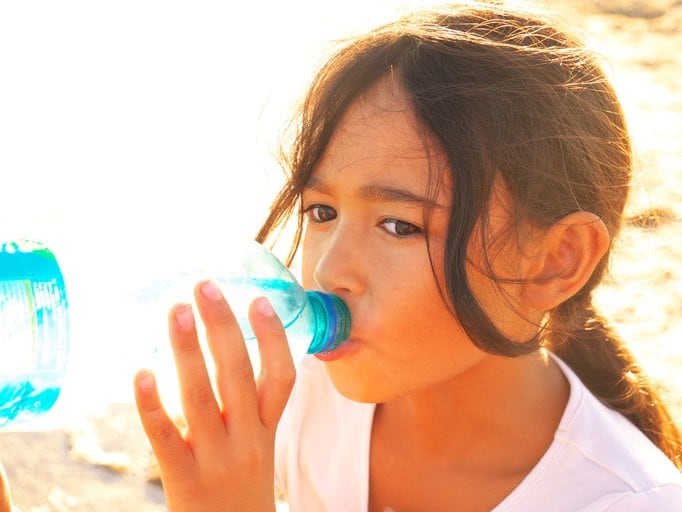Tips To Keep Kids Safe In High Temperatures
By Owen Debowy, MD, PhD, FACP, FAAP

With heat advisories in effect through the Commonwealth and the temperatures forecasted to be in the 90s through Thursday in Attleboro, your Sturdy Health primary care team wants to share a few tips to keep yourself and the children in your life safe.
“As pediatricians, we are typically stressing the importance of being outside, and how playing and exercising outside boosts a child's physical and mental health,” said Owen Debowy, MD, PhD, FACP, FAAP, vice chair of the Department of Pediatrics and Department of Medicine at Sturdy Health. “However, when the temperatures are at or above 90°F, it poses a significant health risk.”
According to the American Academy of Pediatrics, high temperatures and extreme heat can cause children to become sick very quickly in a number of ways. It can cause increased irritability, dehydration, heat exhaustion, heat cramps, and heat stroke, which is a medical emergency.
Stay Cool and Be Safe
When it's very hot, going to the beach or swimming pool for a brief time or staying inside to work on crafts, reading or playing board games makes the most sense. With a few days in a row of 90-degree temperatures ahead, try to think of creative ways to have kids switch up their activities and avoid "cabin fever" or restless, irritable feelings. “Simple and fun yoga stretches, playing hide-and-seek indoors, or making up fun, physical challenges that aren't too strenuous are a few ways to keep the children entertained,” said Dr. Debowy.
Not enough air conditioning at home? The City of Attleboro has places like the Attleboro Public Library and the Bartek Recreation Center open all day and free to the public to help beat the heat. “A trip to the mall can help keep you cool and be good exercise as you are walking around,” adds Dr. Debowy.
If you are staying at home, close your window blinds and curtains to help keep things cool. Lower floors in the home tend to be cooler. Fans may be helpful in cooling down if you have no access to any air conditioning. However, the American Academy of Pediatrics does warn that “fans should not be used in extreme heat (high 90s and up) because they don't cool the air; using fans when temperatures are higher than body temperature may cause the body to gain instead of lose heat”.
If you do use a fan, keep it at a safe distance from you and your little ones to avoid safety hazards like pinched fingers or fans connecting with water.”
Tips To Beat the Heat
When you do decide to venture outside, there are several steps you can take to beat the heat and protect your child from heat-related illness and hazards:
- Stay hydrated: Encourage your children to drink water frequently, so make sure you have it readily available—even before they ask for it. Take water bottles with you if you go out. The American Academy of Pediatrics advises that on hot days, infants receiving breast milk in a bottle can be given additional breast milk, but they should not be given water, especially in the first 6 months of life. Infants receiving formula can be given additional formula in a bottle.
- Dress lightly: Light-colored clothing can help kids stay cool and prevent heat stress from excessive heat absorption. Also try to choose loose fitting clothing that offers both adequate ventilation and protection against direct sun exposure. Clothing made with just one layer of absorbent material can help maximize the evaporation of sweat, which has a cooling effect (kids have lower sweat rates adults).
- Sunscreen, Sunscreen, Sunscreen: Be sure to use plenty of sunscreen, as well as to reply according to the label directions and especially when playing in the water.
- Plan for extra rest time: Heat can often make children (and their parents and caregivers) feel tired. High heat can not only cause people to feel tired, but it may also contribute to irritability. Come inside regularly to cool off, rest and drink water.
- Cool off with water. When your child is feeling hot, give them a cool bath or water mist to cool down. Swimming is another way to cool off while staying active, and the splash pad at the Capron Park Zoo another way to dial down the temperature and dial up the fun!
- Never, ever leave your child alone in a car: The inside of a car can become dangerously hot in just a short amount of time, even with the windows open.
Dr. Debowy encourages parents and caregivers to call your pediatrician or go to Urgent Care immediately if your child develops any of the following symptoms:
- Feeling faint
- Extreme tiredness (unusually sleepy, drowsy, or hard to arouse)
- Headache
- Fever
- Intense thirst
- Not urinating for many hours
- Nausea
- Vomiting
- Breathing faster or deeper than normal
- Skin numbness or tingling
- Muscle aches
- Muscle spasms
Dr. Debowy said that parents and caregivers should not hesitate to call their child's pediatrician for guidance on how to protect your child during extreme heat or with any concerns. “That’s what we are here for. We are here to help and be a part of your family’s well-being.”
Owen Debowy, MD, PhD, FACP, FAAP, is the vice chair of the Department of Pediatrics and Department of Medicine at Sturdy Health.